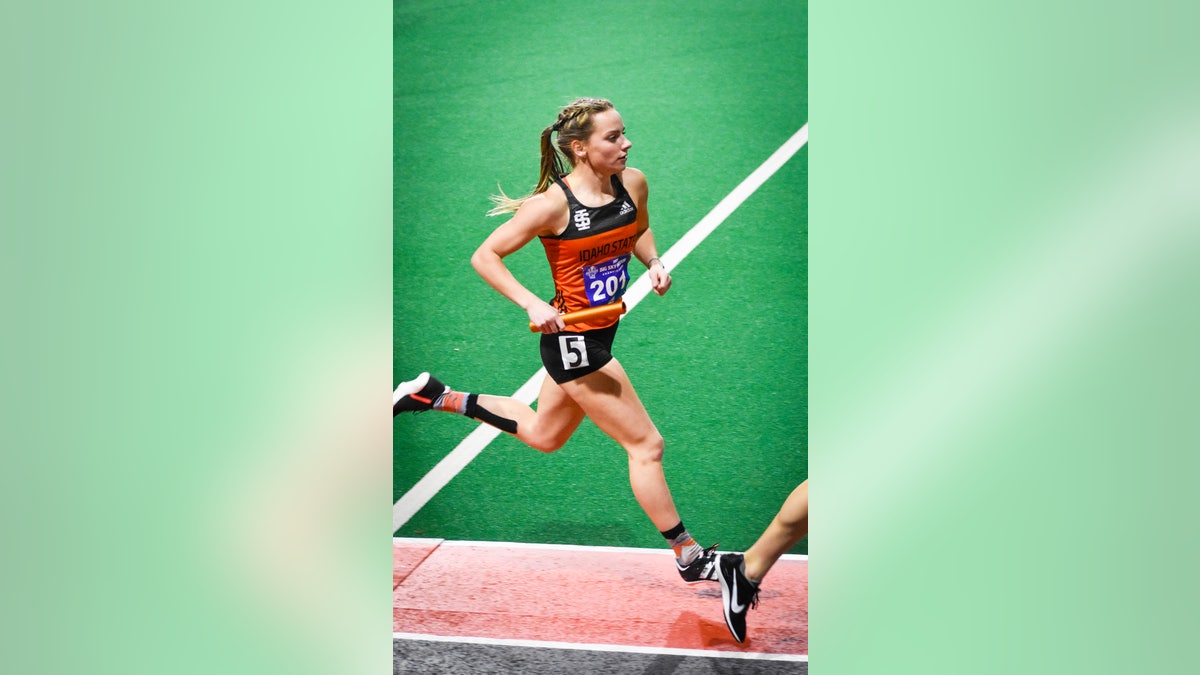Idaho state track athlete speaks out after losing to a transgender athlete: We need a 'level playing field'
Madison Kenyon and her attorney Kristen Waggoner joined 'Fox & Friends First' to discuss fairness in women's sports.
NBC News recently declared that women are engaging in "transphobic rhetoric" simply by offering reasonable objections to the destruction of their sports.
No doubt we will hear the same thing as we approach the upcoming Winter Olympics, if any female athletes express concern about the International Olympic Committee’s new transgender athlete guidelines.
LIA THOMAS FINDS SUPPORT FROM PENN, IVY LEAGUE AHEAD OF WEEKEND MEET

Idaho State University cross-country and track athlete Madison Kenyon. (Madison Kenyon)
Those guidelines include an interesting—and really hypocritical—statement, in which committee members recognize "the need to ensure that everyone, irrespective of their gender identity or sex variations, can practice sport in a safe, harassment-free environment that recognizes and respects their needs and identities."
By "everyone," it seems clear the committee only means people who identify as a sex different than the one they were born with—because by allowing men to compete against women, the committee is pretty much ensuring that female athletes will have to compete less safely and fairly.
And, for any women who object to that, it’s clear that many authority figures—coaches, administrators, sports officials, elected officials, and even the Olympic Committee itself—will not only harass them, but refuse to respect their needs and identity.
I know how frustrating all this is. I’ve been competing for the last three years as a track-and-field athlete at Idaho State University, where five times I’ve lost competitions to a male who chose to identify as a woman.
Any female athlete can tell you how defeating that is. Being a competitive athlete is about so much more than showing up for the race, or even doing all the workouts and practices. It’s about everything you give up for your sport—the day-after-day of getting up early, the parties you skip because you can’t stay out that late, the family and school events you can’t attend because you’re competing or working with the team. All of that feels trampled underfoot by that male runner pulling ahead of you.
My fellow female athletes and I are not supposed to notice that, suddenly, we’re running against people who aren’t like us—who are naturally stronger and faster, who are suddenly winning all the prizes we’ve worked so hard to obtain, and who now have access to all the scholarships and athletic recognition we’ve legitimately earned.
We’re supposed to smile and cheer and clap and pretend that we’re all very happy about this—that we don’t object to seeing our years of effort and lifelong dreams go up in so much smoke, and that we don’t mind denying reality as long as it pleases the woke crowd and keeps our school safe from a lawsuit.
As an athlete and a biology major, I find it fascinating that the same sports authorities who would think it crazy to put a heavyweight boxer in the ring with a flyweight—just because the first guy "identifies as a flyweight" this week—think it’s perfectly natural to put a male on the running track or soccer field next to a woman and declare that "fair."
It’s like racing a cheetah against an ocelot. You can say, "Well, they’re both basically fast cats with spots," but everyone knows which cat is likely to win the race, every time.
Putting male athletes in women’s sports isn’t fair. Not physically—because biology and common sense both tell us that men and women are different, whether some want to admit it or not.
It’s not something you can fix with testosterone suppression, as even the Olympic Committee now admits. And it poses dangerous risks for women vying against male athletes in contact sports.
It’s reducing athletic competition to two categories: men’s and co-ed. It’s taking away women’s chances not only of winning, but even of fairly competing in sports.
The end results of all that aren’t just sad and wrong; they’re ridiculous—as you can see in this video of a University of Pennsylvania transgender male swimming against women competitors. Or this one, of the mile run in last year’s Big Sky Conference Championships in Idaho, featuring many of the best women runners in that part of the country—and one male.
CLICK HERE TO GET THE OPINION NEWSLETTER
Think of all the women competing in just those two events: of their combined years of practice, sacrifice, and self-denial—all of that gone, the moment the male athlete stepped into the next lane.
Women and girls don’t go out for sports to get a participation trophy. We want to win. We work to win. And the very least we deserve is a fair chance to do that (which is why I’ve chosen to take a stand through my attorneys with Alliance Defending Freedom to defend Idaho’s law protecting women’s sports).
CLICK HERE TO GET THE FOX NEWS APP
We can beat exhaustion, frustration, even a tough team. We can beat the clock. We can beat some pretty tough odds. But in the end, we can’t beat biology—or officials more concerned with pleasing the wokes than "respecting our needs and identities."






